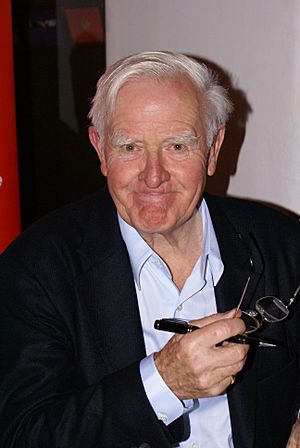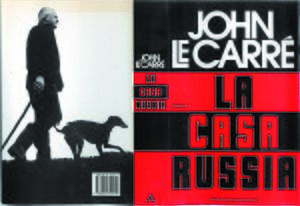John le Carré facts for kids
Quick facts for kids
John le Carré
|
|
|---|---|

le Carré in Hamburg, 2008
|
|
| Born | David John Moore Cornwell 19 October 1931 Poole, England |
| Died | 12 December 2020 (aged 89) Truro, England |
| Occupation |
|
| Citizenship |
|
| Education | |
| Genre | Spy fiction |
| Notable works |
|
| Spouse |
|
| Children | 4, including Nicholas |
| Signature | |
David John Moore Cornwell (born October 19, 1931 – died December 12, 2020) was a famous British and Irish writer. He was known by his pen name, John le Carré. A pen name is a fake name a writer uses instead of their real name.
Le Carré was best known for his spy novels. Many of his books were made into popular movies or TV shows. People thought he was one of the best writers of his time. Before he became a full-time author, he worked for the British intelligence services, MI5 and MI6, in the 1950s and 1960s.
His third novel, The Spy Who Came in from the Cold (1963), became a huge international best-seller. This book was also made into a movie that won awards. Because of its success, he was able to leave his job at MI6 and become a writer all the time. Other famous books of his that became movies or TV shows include Tinker Tailor Soldier Spy (1974) and The Night Manager (1993).
Contents
Early Life and School
Childhood Years
David John Moore Cornwell was born in Poole, England, on October 19, 1931. His father was Ronald Cornwell, and his mother was Olive Moore Cornwell. His mother left the family when he was five years old. He also had an older brother and two younger half-siblings.
His father, Ronald, was a tricky businessman who often got into financial trouble. Their family was always in debt. John le Carré later used his difficult relationship with his father as inspiration for characters in his books, like Rick Pym in A Perfect Spy.
School and Early Work
David started school at St Andrew's Preparatory School and then went to Sherborne School. He didn't like the strict rules of English public schools back then. So, he left early to study languages in Switzerland from 1948 to 1949.
In 1950, he joined the British Army for his National Service. He worked in the Intelligence Corps in Austria. His job was to question people who had crossed the Iron Curtain from the East to the West.
In 1952, he returned to England to study at Lincoln College, Oxford. While there, he secretly worked for the British Security Service, MI5. He watched groups that might have been working for the Soviet Union. After graduating in 1956, he taught French and German at Eton College for two years. Then, in 1958, he became a full-time MI5 officer.
Working as a Spy
As an MI5 officer, John le Carré managed secret agents and questioned people. He also helped with listening in on phone calls. While working for MI5, he started writing his first novel, Call for the Dead (1961).
In 1960, he moved to MI6, which is Britain's foreign intelligence service. He worked secretly as a diplomat in British embassies in Germany. It was there that he wrote The Spy Who Came in from the Cold (1963). He used the pen name "John le Carré" because government staff were not allowed to publish books under their real names. The name le Carré is French for "the square."
In 1964, his career as a spy ended. This happened because a famous British double agent named Kim Philby secretly told the KGB (the Soviet intelligence agency) about British agents. Le Carré later wrote about this betrayal in his novel Tinker Tailor Soldier Spy (1974).
His Books and Writing Style
Le Carré's first two novels, Call for the Dead (1961) and A Murder of Quality (1962), were mystery stories. They both featured a retired spy named George Smiley. His third book, The Spy Who Came in from the Cold (1963), became a huge success. This allowed him to become a full-time writer.
His books often show British spies as regular people, not superheroes. They deal with the difficult moral choices of their work. The stories are more about thinking and psychology than about action or gadgets. Many people see him as one of the best English writers of the 20th century.
John le Carré created the character George Smiley as a contrast to characters like James Bond. Smiley is an overweight, quiet bureaucrat who uses his mind to solve problems. Le Carré felt that Smiley was a more realistic spy.
Le Carré also introduced many terms that are now used in the world of intelligence, like "mole" (a spy who works secretly inside an enemy organization).
After the Iron Curtain fell in 1989, his writing changed. His later books explored the new world after the Cold War. For example, The Night Manager (1993) is about arms smuggling. His final novel, Silverview, was published after he passed away in 2021.
His Views on the World
Protecting Democracy
John le Carré was worried about the future of democracy. He felt that some political trends were similar to what happened in Europe in the 1930s. He believed these trends could lead to the rise of fascism, which is a type of government where one leader has total power and often uses force.
He thought that leaders who wanted to keep their countries as superpowers sometimes ignored the truth. He also believed they showed little respect for voters and the democratic system.
Views on Brexit
Le Carré was strongly against Brexit, which was Britain's decision to leave the European Union. He thought it was a big mistake for Britain. He said that some politicians were trying to make people feel nostalgic for an old England that never really existed. He believed this was being used to get people to support leaving the EU. He also said that his connection to England felt weaker after the Brexit vote.
The Iraq War
In 2003, before the Iraq War began, John le Carré wrote an essay criticizing the idea of going to war. He believed the war was based on false reasons. He also felt that intelligence information was being changed to fit political goals. He was critical of leaders who took their countries to war based on untrue information.
Middle East Policy
Le Carré also had strong opinions on Western countries' policies towards Iran. He believed that Iran's actions were partly a response to being surrounded by countries with nuclear weapons. He also pointed out past actions by Western intelligence services that had affected Iran.
Personal Life
In 1954, David Cornwell married Alison Ann Veronica Sharp. They had three sons, Simon, Stephen, and Timothy, before divorcing in 1971. In 1972, he married Valérie Jane Eustace, who was a book editor. They had a son named Nicholas, who also became a writer.
John le Carré lived in Cornwall, England, for over 40 years. He also had a house in London.
Because he was so disappointed by the 2016 Brexit vote, he decided to become an Irish citizen. His son later said that his father's unhappiness with modern Britain led him to embrace his Irish family roots.
John le Carré passed away on December 12, 2020, at the age of 89, after a fall at his home. His wife, Valérie, died two months later.
His Archive and Awards
In 2010, John le Carré gave his collection of writings and papers to the Bodleian Library at Oxford University. This collection included handwritten drafts of his famous novels.
He received many awards for his writing throughout his life, including:
- 1963, British Crime Writers' Association Gold Dagger for The Spy Who Came in from the Cold
- 1965, Mystery Writers of America Edgar Award for The Spy Who Came in from the Cold
- 1977, British Crime Writers' Association Gold Dagger for The Honourable Schoolboy
- 1988, Crime Writers' Association Diamond Dagger Lifetime Achievement Award
- 2005, Commander of the Order of Arts and Letters, France
- 2011, Goethe Medal, awarded by the Goethe Institute
- 2020, Olof Palme Prize – he gave the prize money to Médecins Sans Frontières.
In 2008, The Times newspaper ranked him as one of the "50 greatest British writers since 1945."
Images for kids
See also
 In Spanish: John le Carré para niños
In Spanish: John le Carré para niños
 | Precious Adams |
 | Lauren Anderson |
 | Janet Collins |


